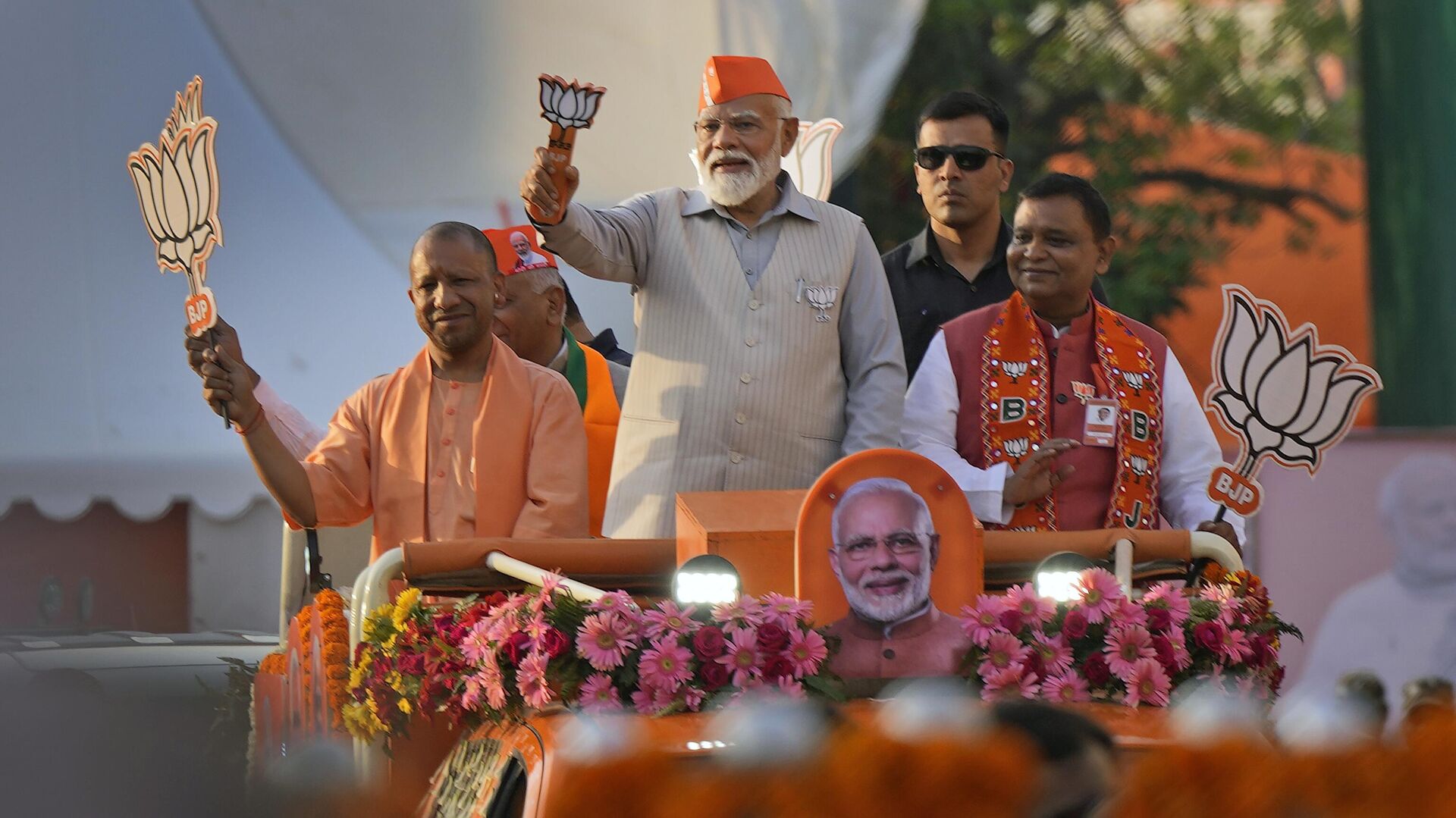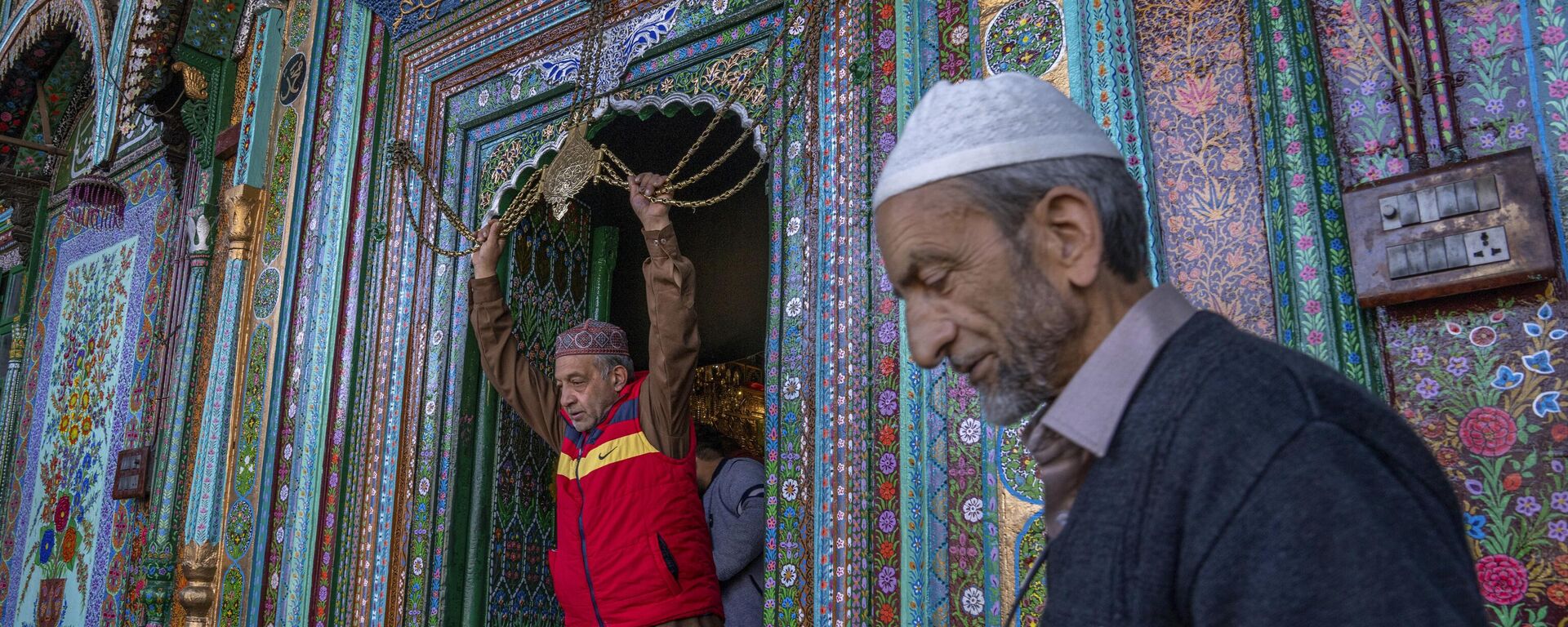https://sputniknews.in/20240608/how-dependence-on-alliance-partners-would-impact-modis-reform-agenda-7556993.html
How Dependence on Alliance Partners Would Impact Modi's Reform Agenda
How Dependence on Alliance Partners Would Impact Modi's Reform Agenda
Sputnik India
Prime Minister Narendra Modi's charismatic leadership will win over allies during his third term in office and his government's reform agenda will not be compromised, a Delhi University academic has said.
2024-06-08T16:42+0530
2024-06-08T16:42+0530
2024-06-08T20:45+0530
sputnik opinion
nitish kumar
narendra modi
jawaharlal nehru
india
rajasthan
uttar pradesh
bharatiya janata party (bjp)
delhi university
andhra pradesh
https://cdn1.img.sputniknews.in/img/07e8/04/0a/7095314_0:161:3071:1888_1920x0_80_0_0_cccb6625edd759a00ba1ffec47e8f1c2.jpg
Indian Prime Minister Narendra Modi's charismatic leadership will win over allies during his third term in office and his government's reform agenda will not be compromised, a Delhi University academic has said.The comments of Ashwani Mahajan, who is the national co-convener of Swadeshi Jagran Manch (SJM), a Rashtriya Swayamsevak Sangh (RSS) affiliate, came after Modi received a historic mandate as the National Democratic Alliance (NDA) led by him won 292 seats in the 543-member Lok Sabha.The RSS is the ideological fountainhead of the Bharatiya Janata Party (BJP).With this, Modi is set to join Jawaharlal Nehru as India's only leader to take oath as Prime Minister for the third time in succession.Though the Modi-led NDA secured a majority to form the next government, the BJP suffered setbacks in Uttar Pradesh, Maharashtra, Bengal, and Rajasthan, resulting in the political outfit's failure to secure a majority on its own.The BJP eventually triumphed on only 240 seats, leaving the BJP short of 32 seats for a simple majority in the Indian Parliament.With Modi now requiring the support of allies to run his government which he didn't need in his previous two terms, there is chatter about the possible implications of the fractured mandate on his reform agenda.However, Mahajan reckons that the compulsions of coalition politics will not impact Modi's government much as his main allies, the Telugu Desam Party (TDP) boss Chandrababu Naidu and Janata Dal (United) leader Nitish Kumar are known for their good governance in their respective states of Andhra Pradesh and Bihar.Besides, much like Modi, both Naidu and Kumar are known for their strict stance on corruption.UCC will see India having common civil laws for marriage, divorce, etc across religions in the South Asian nation. At present, India has different sets of laws for Muslims and Hindus in this domain.Through "One Nation One Election" the BJP wishes to empower the Election Commission of the country to hold simultaneous polls to the Parliament and all the state assemblies at the same time. At present, there are different timelines for elections to the Lok Sabha and state legislatures.Notably, simultaneous polls for the Parliament and assemblies for states were held till 1971 before former Prime Minister Indira Gandhi abolished that system.Also, the Delhi University professor believes that there would be no letdown in the government's zero-tolerance towards corruption.On the other hand, Dr. Abhinav Pandya, the CEO of the Rajasthan-based geopolitical think tank Usanas Foundation reckons that BJP's ability to implement big-ticket reforms, especially the ones that relate to its Hindutva ideology would be hampered by the return of coalition politics in the country.According to the critics of the law, it gives unlimited powers to the Waqf Board (the top administrative Muslim body).For instance, a 1500-year-old Hindu shrine was declared a Wakf property in Tamil Nadu a few years ago.
https://sputniknews.in/20230604/why-india-is-seeking-a-uniform-civil-code-2258214.html
india
rajasthan
uttar pradesh
andhra pradesh
west bengal
haryana
Sputnik India
feedback.hindi@sputniknews.com
+74956456601
MIA „Rossiya Segodnya“
2024
Pawan Atri
https://cdn1.img.sputniknews.in/img/07e6/0c/13/139630_147:0:831:684_100x100_80_0_0_8fa2b25903e7787fe6a2698552c167df.png
Pawan Atri
https://cdn1.img.sputniknews.in/img/07e6/0c/13/139630_147:0:831:684_100x100_80_0_0_8fa2b25903e7787fe6a2698552c167df.png
News
en_IN
Sputnik India
feedback.hindi@sputniknews.com
+74956456601
MIA „Rossiya Segodnya“
Sputnik India
feedback.hindi@sputniknews.com
+74956456601
MIA „Rossiya Segodnya“
Pawan Atri
https://cdn1.img.sputniknews.in/img/07e6/0c/13/139630_147:0:831:684_100x100_80_0_0_8fa2b25903e7787fe6a2698552c167df.png
lok sabha, nda, bjp, polls, india election 2024, narendra modi, i.n.d.i.a, congress, 2024 lok sabha poll results, 2024 elections bjp, 2024 lok sabha elections, bjp seats 2024 polls, bjp seats 2024 elections, nitish kumar, chandrababu naidu,
lok sabha, nda, bjp, polls, india election 2024, narendra modi, i.n.d.i.a, congress, 2024 lok sabha poll results, 2024 elections bjp, 2024 lok sabha elections, bjp seats 2024 polls, bjp seats 2024 elections, nitish kumar, chandrababu naidu,
How Dependence on Alliance Partners Would Impact Modi's Reform Agenda
16:42 08.06.2024 (Updated: 20:45 08.06.2024) Indian PM Narendra Modi vowed to bring a slew of reforms in his third term but a fractured mandate in the 2024 national polls has cast doubts about it. Sputnik India examines how dependence on alliance partners would impact his reform agenda.
Indian Prime Minister Narendra Modi's charismatic leadership will win over allies during his third term in office and his government's reform agenda will not be compromised, a Delhi University academic has said.
The comments of Ashwani Mahajan, who is the national co-convener of Swadeshi Jagran Manch (SJM), a Rashtriya Swayamsevak Sangh (RSS) affiliate, came after Modi received a historic mandate as the National Democratic Alliance (NDA) led by him won 292 seats in the 543-member Lok Sabha.
The RSS is the ideological fountainhead of the Bharatiya Janata Party (BJP).
With this, Modi is set to join Jawaharlal Nehru as India's only
leader to take oath as Prime Minister for the third time in succession.
Though the Modi-led NDA secured a majority to form the next government, the BJP suffered setbacks in Uttar Pradesh, Maharashtra, Bengal, and Rajasthan, resulting in the political outfit's failure to secure a majority on its own.
The BJP eventually triumphed on only 240 seats, leaving the BJP short of 32 seats for a simple majority in the Indian Parliament.
With Modi now requiring the support of allies to run his government which he didn't need in his previous two terms, there is chatter about the possible implications of the fractured mandate on his reform agenda.
However, Mahajan reckons that the compulsions of coalition politics will not impact Modi's government much as his main allies, the Telugu Desam Party (TDP) boss Chandrababu Naidu and Janata Dal (United) leader Nitish Kumar are known for their good governance in their respective states of Andhra Pradesh and Bihar.
Besides, much like Modi, both Naidu and Kumar are known for their strict
stance on corruption.
"Nothing is going to change in the current scenario. The reason is that the NDA partners, most of them have a long association with the BJP. On top of BJP's ideological agenda is bringing a Uniform Civil Code (UCC) in the country and for that, Modi would have to take his alliance partners into confidence and I think some consensus would definitely emerge," Mahajan told Sputnik India on Friday.
"As far as 'One Nation One Election' is concerned they may agree to it because it is beneficial to the nation in terms of saving millions of dollars in taxpayer money," he added.
UCC will see India having
common civil laws for marriage, divorce, etc across religions in the South Asian nation. At present, India has different sets of laws for Muslims and Hindus in this domain.
Through "One Nation One Election" the BJP wishes to empower the Election Commission of the country to hold simultaneous polls to the Parliament and all the state assemblies at the same time. At present, there are different timelines for elections to the Lok Sabha and state legislatures.
Notably, simultaneous polls for the Parliament and assemblies for states were held till 1971 before former Prime Minister Indira Gandhi abolished that system.
Also, the Delhi University professor believes that there would be no letdown in the government's zero-tolerance towards corruption.
On the other hand, Dr. Abhinav Pandya, the CEO of the Rajasthan-based geopolitical think tank Usanas Foundation reckons that BJP's ability to implement big-ticket reforms, especially the ones that relate to its Hindutva ideology would be hampered by the return of coalition politics in the country.
"There will be a lot of obstructions in carrying through their larger agenda like the abolition of the Wakf Act of 1995," he told Sputnik India.
According to the critics of the law, it gives unlimited powers to the Waqf Board (the top administrative Muslim body).
For instance, a 1500-year-old Hindu shrine was declared a Wakf property in Tamil Nadu a few years ago.
"Even when the people vote for the BJP, they expect the party to bring these changes. For instance, in their last term, the Modi government scrapped Article 370 which granted semi-autonomous status to Kashmir, which was in a way stopping the developmental schemes from reaching there," Pandya concluded.



